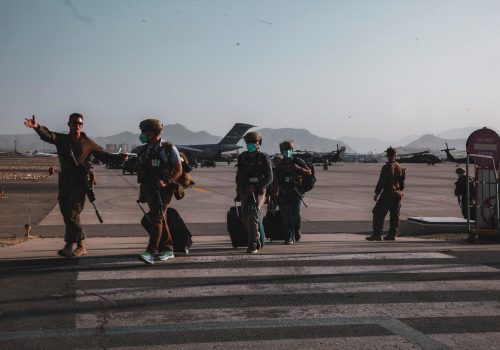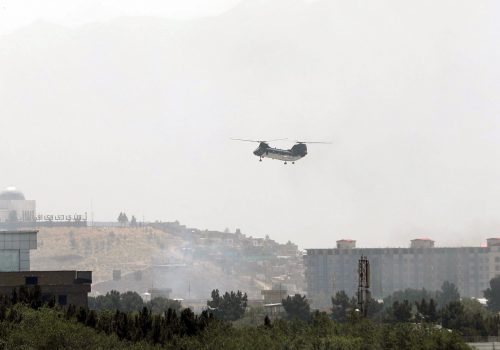What Washington owes the American people after its Afghanistan failure
The discussion about what the United States should do in the aftermath of its war in Afghanistan should proceed in three phases: now, soon, and soon thereafter.
The most urgent task is to evacuate people from Afghanistan. The list includes all Americans and foreign nationals who wish to leave, as well as Afghans who, by virtue of having worked with and for foreign militaries or other foreign organizations, believe that their lives are in danger. A third group includes Afghans who simply wish to leave because Afghanistan under the Taliban is going to be a horrible place to live.
The White House and members of Congress have mostly been focused on evacuating some eighty thousand people, but the numbers of Afghan émigrés and refugees could range from 400,000 to more than two million. Many of them are likely to resettle in neighboring countries, especially Iran and Pakistan, but the United States has a special responsibility to lead on this matter.
After all, the United States is more than capable of resettling tens or even hundreds of thousands of people who wish to build a new life here. For much of its history, the United States was a safe haven for those fleeing war, political oppression, or severe poverty. Nearly every generation of Americans saw a new crop of arrivals, from millions of Irish escaping the famine and Jews fleeing pogroms to the Vietnamese and Hmong who came here in the 1970s and early 80s. Some of the most shameful episodes in US history involved efforts to keep people out—from the Chinese Exclusion Act to the callous indifference to European Jews fleeing the Nazis.
Now, with the delta variant of the coronavirus rampaging through the ranks of the unvaccinated, and with many millions of Americans still out of work, some might wonder about this country’s ability to provide a home to tens of thousands of Afghans. Yet consider that Canada, with a population roughly one-tenth that of the United States, has pledged to resettle an additional twenty thousand refugees.
It is unreasonable for the Biden administration to coerce allies and partners to shelter, for many months or longer, tens of thousands within their borders because the US government is unable to process applications in an expeditious manner. Even if Congress does not revise US laws, President Joe Biden still retains considerable authority to relax or suspend certain immigration rules during times of genuine emergency. This is one of those times. He should wield these powers.
‘Self-licking ice cream cone’
Once the urgent task of evacuations is completed, the nation should swiftly turn to the matter of accountability. The United States, going back to George W. Bush’s administration, spent nearly $89 billion to train Afghan security forces. In light of what happened in Afghanistan over the last two weeks, the focus should be on where that money went, how it was spent, and why that mission failed so completely.
It is now clear that US officials made false or misleading statements for many years about the state of those forces. The Washington Post’s “Afghanistan Papers” revealed many such instances in a 2019 series drawing on interviews conducted by the Special Inspector General for Afghanistan Reconstruction (SIGAR).
Bob Crowley, a US Army colonel who advised coalition forces on counterinsurgency in 2013 and 2014, told government interviewers: “Every data point was altered to present the best picture possible. Surveys, for instance, were totally unreliable but reinforced that everything we were doing was right and we became a self-licking ice cream cone.”
On Tuesday, SIGAR released the latest in a series of damning assessments that mostly reiterated its earlier findings. “As security deteriorated and demands on donors increased, so did pressure to demonstrate progress. US officials created explicit timelines in the mistaken belief that a decision in Washington could transform the calculus of complex Afghan institutions, powerbrokers, and communities contested by the Taliban.”
Progress wasn’t the result. “Rather than reform and improve, Afghan institutions and powerbrokers found ways to co-opt the funds for their own purposes,” the report continued, “which only worsened the problems these programs were meant to address. When US officials eventually recognized this dynamic, they simply found new ways to ignore conditions on the ground.”
Shining a light
Admiral James Stavridis (Ret.) comes to a similar conclusion. “In Afghanistan,” the former supreme allied commander at NATO observed, “our hubris and arrogance did not serve us well.… And the endemic corruption on the part of the Afghan government at every level hurt us badly, but we did not do enough to root it out.”
The most charitable thing that can be said is that individuals were shading the truth for a higher purpose: They downplayed unpleasant facts to maintain a modicum of public support. Others might have believed what they were saying was true—or should be true. Yet some frankly lied, and a few might even have lied under oath. A failure to hold these individuals accountable would have serious ramifications for a country committed to promoting democracy and transparency. The United States cannot perform this role if it does not first turn the light on itself.
We have avoided similar reckonings in the past. The “credibility gap” from the Vietnam era refers to the problem of US government officials saying things about the durability of the South Vietnamese government or the fighting effectiveness of its army, for two examples, which turned out not to be true. Millions of Americans simply assumed thereafter that government officials were routinely lying to them, a problem further exacerbated by the Nixon administration’s Watergate cover-up and revelations about Central Intelligence Agency programs that violated domestic and international laws.
The collapse in public trust is not confined to government statements regarding foreign wars. Today, millions of Americans seem unable to differentiate fact from fiction, and many are particularly skeptical of what the government tells them. This is quite literally killing thousands of people right now who refuse a COVID-19 vaccine.
In international relations, a nation’s actions in one place don’t necessarily say anything about how it will act elsewhere. Credibility generally does not travel. A nation’s willingness to defend Thing A from attack says nothing about its ability to defend things B or C. A government’s credibility can be eroded when it is caught in a pattern of wishful thinking, deception, falsehoods, or outright lies. That is precisely what has happened with this war over a decade or more.
Breaking the cycle
Recognizing that US officials felt compelled to lie about progress in Afghanistan speaks to a third urgent task: ensuring that US strategy is well aligned with the resources available to execute it. This, in turn, is a function of public will. Such alignment is particularly important with respect to counterinsurgency campaigns and armed nation-building.
When reporting on Afghanistan, US government officials were aware that there was little public appetite for a long, costly undertaking there. To be sure, there was broad support, especially in the immediate aftermath of the 9/11 attacks, for a mission aimed at defeating al-Qaeda and rooting out terrorists. Yet the far more ambitious strategy, one that aimed to restructure the basic contours of Afghan society, politics, and economics, demanded a truly generational commitment. If asked a simple question about what that would take, there was only one honest answer: far greater effort than expended so far, and for an extended period of time. Knowing that this is precisely what the American people did not want to hear, US leaders persisted with a futile strategy that was increasingly disconnected from the facts.
Sustaining public support is a perennial challenge when waging counterinsurgency on behalf of another government, but the conditions in Afghanistan were especially inauspicious. Biden appears to have harbored doubts about the strategy for many years; once he was in a position to break the cycle, he did so.
As the president explained on Monday, “I will not mislead the American people by claiming that just a little more time in Afghanistan will make all the difference.… Our mission to degrade the terrorist threat of al-Qaeda in Afghanistan and kill Osama bin Laden was a success. Our decades-long effort to overcome centuries of history and permanently change and remake Afghanistan was not.”
It now falls to Biden—and his successors—to ensure that the future of US global engagement is conducted honestly, without subterfuge and spin, and with the full support of the American people.
Christopher Preble is co-director of the New American Engagement Initiative of the Atlantic Council’s Scowcroft Center for Strategy and Security.
Further reading
Image: US President Joe Biden delivers remarks on the crisis in Afghanistan during a speech in the East Room at the White House in Washington on August 16, 2021. Photo by Leah Millis/Reuters.


